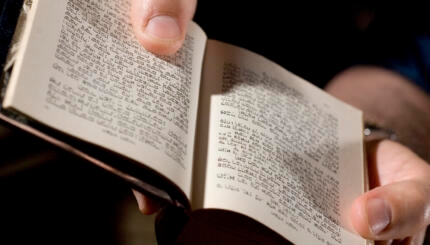How many of us were roused this morning by the sound of a rooster?
Probably not many. Yet that precise event is acknowledged in the first blessing of Birkot Hashachar, the introductory blessings recited at the start of services each morning.
These blessings recognize God’s presence in the seemingly mundane acts of waking up, getting out of bed and getting dressed each day. Taken as a unit, they are a beautiful expression of thanks that we have the opportunity to experience another day.
Originally spelled out in the Talmud, these blessings were associated with specific actions.
With your help, My Jewish Learning can provide endless opportunities for learning, connection and discovery.
For instance, upon opening the eyes in the morning, one is instructed to thank God “who has given the rooster [in Hebrew: sechvi] the ability to distinguish between day and night.” When getting out of bed, we are to thank God “who makes mankind’s steps firm.” Upon getting dressed, God is thanked as the one “who girds the people Israel in strength.”
Eventually, all of the 15 blessings were compiled as a liturgical unit and placed at the beginning of the morning service. Interestingly, the version that most Jewish worshippers outside of Orthodox communities recite does not represent the original text. Three blessings in particular have been reworded in order to change the focus to positive aspects of giving thanks.
“Blessed are you God, Sovereign of the universe, who did not make me a slave,” was changed to “Blessed are you God, Sovereign of the universe, who made me free.”
While that seems to be an innocuous change, others reflect the changing face of Jewish life.
“Blessed are you God, Sovereign of the universe, who did not make me a non-Jew,” was (perhaps predictably) changed to “Blessed are you God, Sovereign of the universe, who made me Jewish.”
The original Hebrew text of that blessing might be a source of discomfort to the modern ear. Certainly the author of those words was giving thanks for the privilege of being Jewish and an heir to the vast and rich tradition of the Jewish people. But the expression of those feelings resonates much differently in a world where Jews and non-Jews live and mingle freely. How would our non-Jewish friends and neighbors react if they felt that we gave thanks each morning specifically for not being like them? Instead, we articulate the fact that we are thankful for being Jewish–certainly a positive way to begin each day.
Finally, the last of these three negative blessings may be the most misunderstood: “Blessed are you God, Sovereign of the universe, who did not make me a woman.”
Why would this blessing have even been written down, let alone recorded for posterity in our prayer book?
According to Orthodox Jewish law, women do not carry the same religious obligations of men. Specifically, they are not required to perform time-bound commandments — that is, ritual acts that need to be done at a certain time.
At one point in history, this made perfect sense. Women used to be the exclusive caretakers of the household—taking care of the children and seeing to everything that needed to be done at home. It would have been an impractical and onerous burden to also require them to show up in synagogue at a given time each day. So a male worshipper would recite the blessing “who did not make me a woman” to express thanks for being able and required to fulfill those commandments.
What did women recite? What did they give thanks for in place of that blessing? “Blessed are you God, Sovereign of the universe, who made me according to your will.” (In other words, thanks anyway.)
In the span of a mere page in the prayer book, the blessings of Birkot Hashachar allow us to start each day in gratitude for what we would otherwise take for granted — waking up, having clothes to wear, and possessing the ability to see the world around us. These are all profound thoughts, and often not first on our minds when just trying to shake off the fog after a night’s sleep.
Most importantly, these blessings help us remember that we live not only as individuals, but within the larger context of Judaism, with our ongoing goal of tikkun olam—fixing the world and bringing about change.
Outside of Orthodox communities, the blessing regarding women has been changed to: “Blessed are you God, Sovereign of the universe, who made me in Your image.”
This emphasizes the fact that we are all created b’tzelem Elohim—in the image of God.
Can you think of a better way to greet each day? And all that before your first cup of coffee.
Cantor Matt Axelrod has served Congregation Beth Israel of Scotch Plains, New Jersey, since 1990. He is a graduate of the Jewish Theological Seminary of America and a national officer of the Cantors Assembly. Cantor Axelrod is the author of “Surviving Your Bar/Bat Mitzvah: The Ultimate Insider’s Guide,” and “Your Guide to the Jewish Holidays: From Shofar to Seder.” You can read his blog at mattaxelrod.com.



